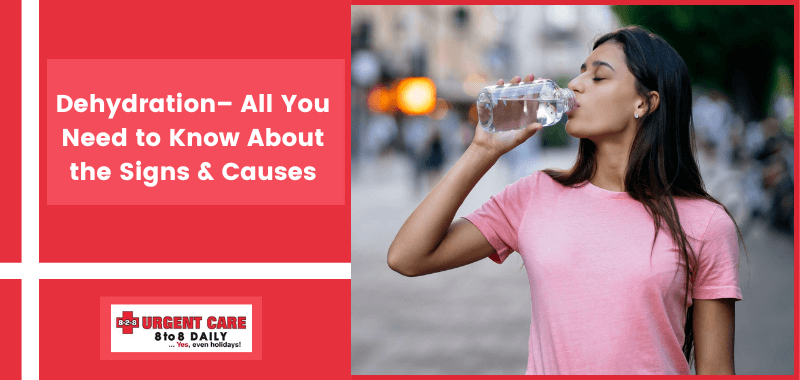


Many people in the United States suffer from dehydration, especially during the hot summer. High temperatures, humidity, and prolonged sun exposure can cause excessive bodily fluid loss, leading to dehydration. Dehydration, however, is not simply a summertime occurrence; it may occur all year round for various causes, including illness, physical activity, and medication. According to a report, 75% of Americans suffer from chronic dehydration. In this blog, we'll drill down into the causes, effects, and signs of dehydration to help you stay hydrated and healthy.
Individuals are concerned about how to diagnose dehydration early on to avoid negative repercussions. Signs and symptoms of dehydration may vary.
If you believe you are dehydrated, consume plenty of fluids such as water or electrolyte solutions. If your condition persists, seek medical assistance immediately, as severe dehydration can be fatal.
Dehydration occurs when the body loses more liquid than it consumes in, and if left untreated, it can have major health repercussions. There are a wide range of causes when it comes to dehydration; below are the highest reported causes of dehydration–
Inadequate fluid intake is one of the leading causes of dehydration. Many people do not consume enough fluids or water, which can cause dehydration.
Consuming sugary, caffeinated beverages and alcohol can aggravate dehydration by increasing urine output and leading to more fluid loss.
Excessive perspiration, which can occur during exercise or in hot conditions, is another major cause of dehydration. Sweating causes the loss of fluids and electrolytes, which can lead to dehydration.
Illnesses that produce significant bodily fluid loss, such as diarrhea, vomiting, and fever, can also lead to dehydration. It's essential to take the right medication to treat such illnesses.
Some medications can also produce dehydration as a side effect. Diuretics, for example, often used to treat high blood pressure, can stimulate urine production and cause fluid loss. Dehydration can also be caused by medical diseases such as diabetic insipidus.
Dehydration can occur due to various causes, including insufficient fluid consumption, excessive sweating, illness, medicine, and certain medical disorders. Staying hydrated by consuming enough fluids and electrolytes is critical, especially when you are ill, in the hot weather or when engaging in physical activity. If you persistently suffer signs of dehydration, such as thirst, dry mouth, or dark urine, you must rehydrate immediately to avoid further health concerns.
Hydration is critical for general health and well-being. Dehydration can cause various health issues, including fatigue, headaches, and more serious diseases, including heat exhaustion or heatstroke. People often wonder how to prevent dehydration effortlessly.
Here are some simple tips to keep you hydrated:
By following these guidelines, you can stay hydrated and avoid the detrimental health effects of dehydration. Remember to prioritize your hydration needs and incorporate them into your daily routine.
Are you experiencing symptoms of dehydration such as thirst, dark urine, dry mouth, fatigue, dizziness, or headache? Visit the 8-2-8 Urgent Care center now for prompt and effective treatment. Our experienced healthcare professionals can quickly assess your condition, provide IV fluids, if needed and monitor your progress to ensure a full and speedy recovery. You can also contact 8-2-8 Urgent Care and our staff will walk you through our online check-in from the convenience of your home! Call (760) 216-6253.